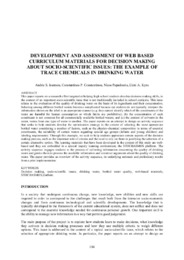Development and assessment of web based Curriculum materials for decision making About socio-scientific issues: the example of Trace chemicals in drinking water

Προβολή/
Ημερομηνία
2007Συγγραφέας
Ioannou, Andrie S.
Constantinou, Constantinos P.
Papadouris, Nicos
Kyza, Eleni A.
Metadata
Εμφάνιση πλήρους εγγραφήςΕπιτομή
This paper reports on a research effort targeted at helping high-school students develop decision-making skills, in
the context of an important socio-scientific issue that is not traditionally included in school curricula. This issue
relates to the evaluation of the quality of drinking water on the basis of its ingredients and their concentration.
Selecting among different bottled waters becomes complicated because (a) students do not typically interpret the
information shown on the label in an appropriate manner (e.g. they cannot identify which of the constituents of the
water are harmful for human consumption or which limits are prohibitive); (b) the concentration of each
constituent is not common for all commercially available bottled waters; and (c) the content of solvents in the
water, varies from one type of water to another. The paper reports on an attempt to design an activity sequence
that seeks to help students develop the optimization strategy in the context of selecting the most appropriate
bottled water considering a number of factors, such as the physico-chemical composition in terms of essential
constituents, the suitability of certain waters regarding special age groups (infants and young children) and
labeling requirements. Through this example, we seek to help students appreciate certain aspects of the decision
making process, such as the important role of criteria and the need to rely on them in justifying the selection of a
certain alternative option. The learning materials that have been developed in the context of this study are webbased
and they are embedded in a special inquiry learning environment, the STOCHASMOS platform. The
activity sequence engages students in the process of collecting information concerning the quality of drinking
water and guides them to process the available information and construct arguments about the quality of drinking
water. The paper provides an overview of the activity sequence, its underlying rationale and preliminary results
from a pilot implementation.